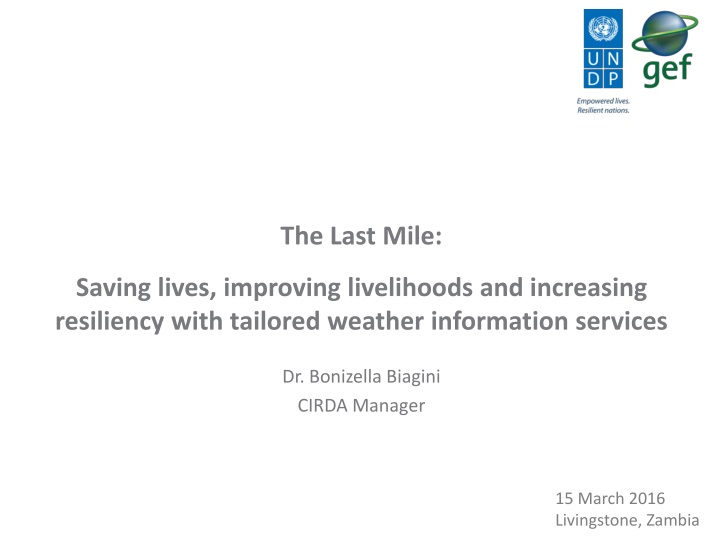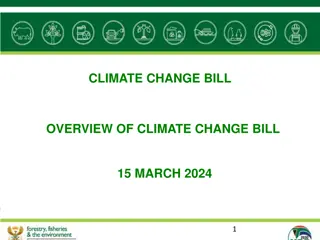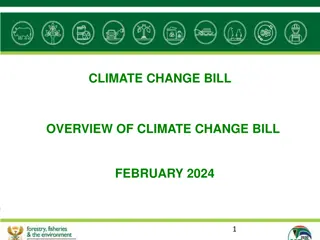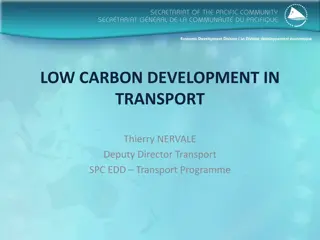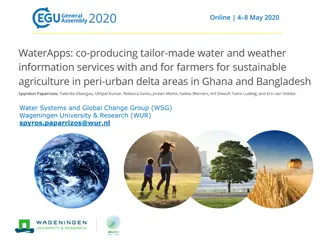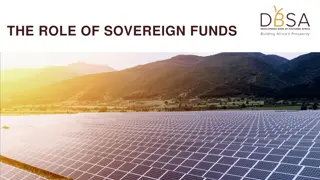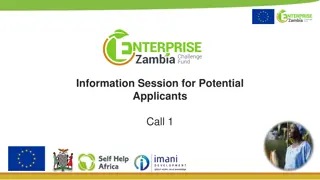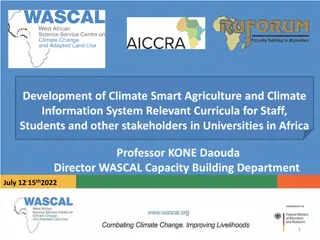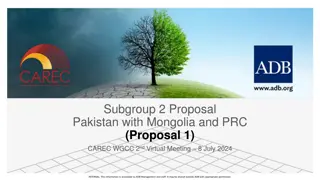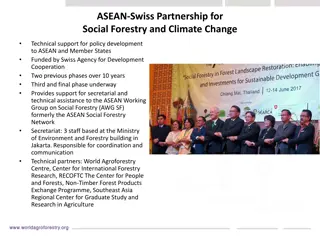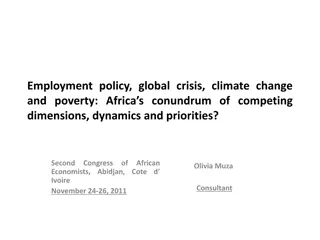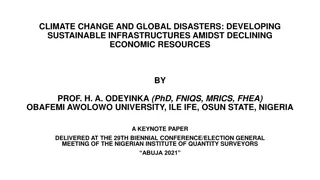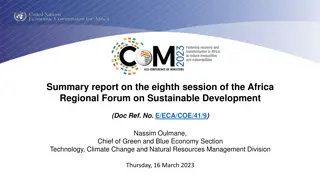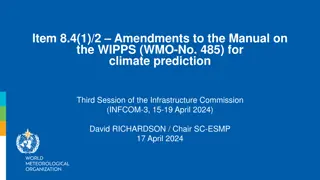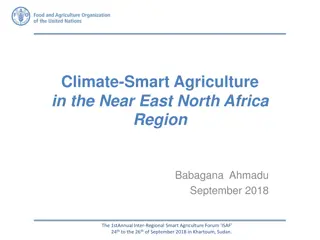Advancing Climate Services for Sustainable Development in Africa
The initiative led by Dr. Bonizella Biagini in Livingstone, Zambia, focuses on providing tailored weather information services to save lives, improve livelihoods, and enhance resiliency in 11 countries. The project aims to support climate services, integrate data into development planning, engage the private sector, and share best practices through knowledge management. Progress includes on-the-ground support, data rescue, procurement, technology transfer, and capacity building, with indicators showing advancements in equipment deployment and infrastructure development.
Download Presentation

Please find below an Image/Link to download the presentation.
The content on the website is provided AS IS for your information and personal use only. It may not be sold, licensed, or shared on other websites without obtaining consent from the author.If you encounter any issues during the download, it is possible that the publisher has removed the file from their server.
You are allowed to download the files provided on this website for personal or commercial use, subject to the condition that they are used lawfully. All files are the property of their respective owners.
The content on the website is provided AS IS for your information and personal use only. It may not be sold, licensed, or shared on other websites without obtaining consent from the author.
E N D
Presentation Transcript
The Last Mile: Saving lives, improving livelihoods and increasing resiliency with tailored weather information services Dr. Bonizella Biagini CIRDA Manager 15 March 2016 Livingstone, Zambia
CIRDA Overview Support focused on Provides support to 11 countries. Data and tech transfer Identify and reach end users Mainstream/integrate data into development planning (NAPs) Financial sustainability planning Burkina Faso Objectives Support climate services in their efforts to collect, analyse and disseminate climate information for long term planning and adaptation Meet the need to generate timely, high quality climate information that is comprehensible and applicable to end users Enable communities makers to access climate information The Gambia Sierra Leone Ethiopia Benin Uganda Liberia S oTom andPr ncipe Tanzania Zambia Malawi and policy 2
Progress on Global Support On the ground support on hydrology, technology, meteorology and forecasting Data rescue and digitization support Workshops on forecasting and technologies (creating tools) Procurement support to at least 7 partners Establishment of Long Term Agreements (LTAs) to enable acquisition of CI technologies and services Technical Assistance to National Teams Market study to identify partnerships and potential for revenue streams Workshops on private sector engagement (Uganda) and application development (Zambia) Outreach to mobile phone companies, technology providers, financial sector and other PS potential partners Private Sector Engagement Facilitating dialogue among government and non governmental stakeholders Communication toolkit for national projects Communication platform to share achievements, best practices and lessons learned Creating new tools to communicate climate and weather information to a broad audience South South Cooperation to identify best practices- missions and advice on training opportunities Knowledge Management and best practices sharing 3
Project Progress Indicators Direct CIRDA Support (# of field missions) Capacity Improvement (% achieved of targeted improvement) Technology Transfer (Equipment Procured) 7 automatic agro-climatic stations 3 automatic synoptic stations 140 limnimetric staff-gauges 20 automatic limnimetric recorders 1 sea buoy, 2 ADCPs 2 multi-parameters and portable analyzers of sea water 19 hydrological stations were rehabilitated Benin 29% 2 Burkina Faso 10% planning procurement of 150 AWS and automatic rain gauges 1 Plan to use LTA 9 AWS (WMO-compliant) 40 AWS 1 upper air radio sonde LTA 11 lightning sensors The Gambia Preparatory phase 2 progress was registered - technical trainings and awareness- creation events Ethiopia 1 Liberia Preparatory phase 1 11 real time all-in-one AWS (the full service - includes renewal of services for up to 5 years) Plan to use LTA 10 AWS - the international tender process was finalized - technical requirements were sent to CIRDA for the development of specifications LTA - signed contract with the Procurement Support Unit to outsource procurement - 8 lightning sensors with 8 surface observation stations and 2 synoptic stations (mix between WMO-compliant and innovative technologies) 16 AWS 10 hydro stations 50 river gauges 20 automatic rainfall gauges LTA 20 AWS a lighting detection network 5 sensors with 5 real time all-in-one AWS progress was registered - NMHS staff attending university programmes, technical trainings and awareness-creation events Malawi 3 Sao Tome and Principe progress was registered - technical trainings, project management and journalists' trainings 0 Planned Q2 Sierra Leone Preparatory phase 2 progress was registered - technical trainings, awareness-creation events Tanzania 3 Uganda 20% 4 Zambia 27% 26 AWS 3 4 Domestic NMHS financing Zambia (increased 50%), Uganda (increased by more than 100% - radar acquisition), Benin (increased 10%)
General Challenges Building Capacity Technology and Services Partnerships Lack of institutional coordination and information exchange, including resources management Going beyond hardware and observations to forecasts and applications Growing need for capacity building and specialized training Identifying complementary roles of governments, private sector and civil society Understanding and accessing innovative technologies and services, know how and software Need for procurement support and other services, including communication Limited tools available in countries to package and communicate information sectorally for access to end users Absence of regional cooperation even among neighboring countries 5
Current Challenges Status of implementation: Some countries are still in the process of acquiring technology that forms the basis for climate information and early warnings Most countries that have acquired the technology have not yet transformed the basic observations from their systems into useful and actionable information Next steps: weather and climate observations to be included into: Weather and climate forecasts Fundamental input to the NAPs Public Last Mile products and services (early warnings), and Private Last Mile products and services (sustainability applications) 6
Goals of this Workshop 1. 2. Now we increasingly have the data collection. How can we transform data to information, and communicate the last mile to help vulnerable communities? This is how: Explore pathways to make the data available to end users through local networks, technology, and partnerships, including identification of end users needs Consider market opportunities in the form of new weather products and services with the benefit of a Market Study in the 11 partner countries Explore relationships and partnerships with private weather services, NGOs, and others that can help national climate services reach the Last Mile and become more sustainable With technical support, work on country strategies for the next phase of the CIRDA program to reach end users and get to last mile Engage with software developers here in a hackathon to design and develop new applications to transform and communicate weather data to end users 7
Thank you Dr. Bonizella Biagini CIRDA Manager UNDP-GEF bonizella.biagini@undp.org www.undp-alm/porjects/cirda www.undp-cirda.blogspot.com 8
